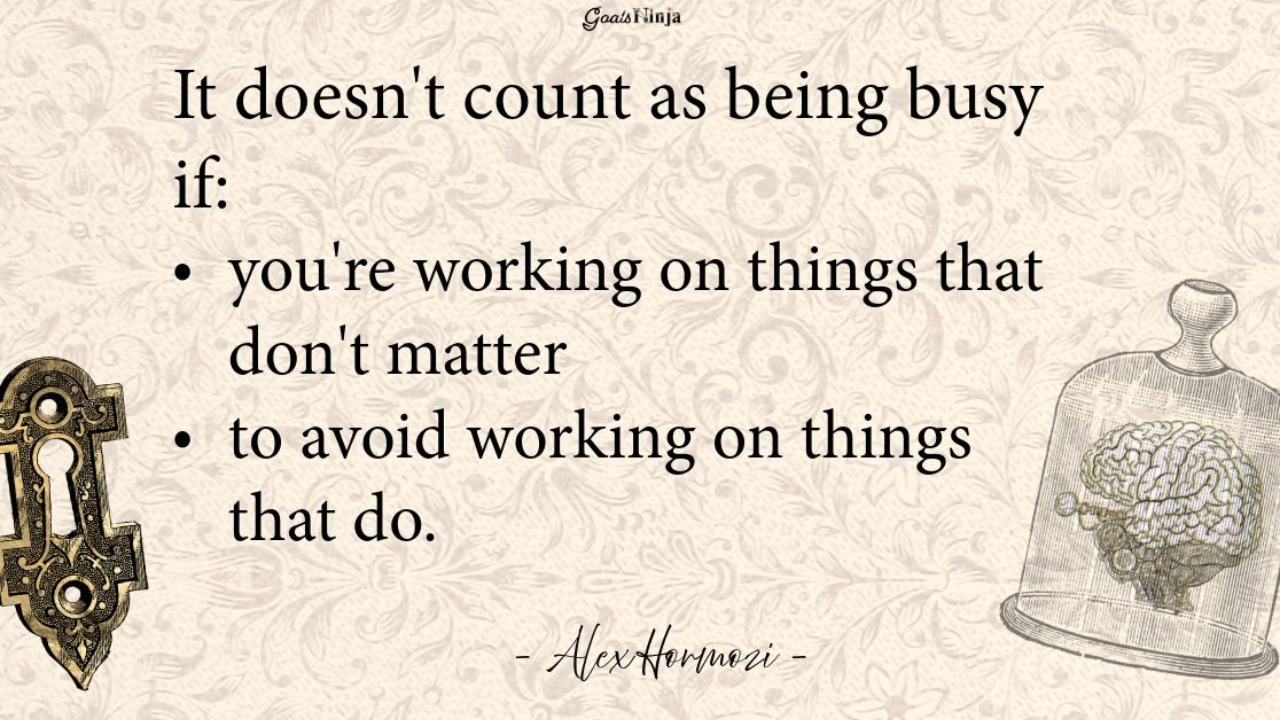The Procrastination Trap: When Being Busy Isn't Progress
Mar 07, 2025
It Doesn't Count as Being Busy if You're Avoiding What Matters
"It doesn't count as being busy if you're working on things that don't matter to avoid working on things that do." – Alex Hormozi
We've all been there—ticking off tasks, answering emails, reorganizing files, convincing ourselves we're being productive. But deep down, we know the truth: we're just avoiding the actual work.
Alex Hormozi puts it perfectly—busyness isn't the same as progress. And yet, we fall into this trap over and over again. Why? Because working on low-stakes, low-resistance tasks feels good. It gives us a sense of control, a temporary dopamine boost, and the illusion of productivity. But at what cost?
The Science Behind Why We Get Stuck
This cycle is more than just a bad habit—it's a self-reinforcing loop of emotional regulation. Research shows that procrastination isn't about laziness; it's about avoiding discomfort (Sirois et al., 2023). When faced with a difficult, high-impact task, our brain looks for relief. And what's easier than switching to something that feels productive but requires less effort?
Procrastination in Different Contexts
Academia
Students often delay critical tasks like studying and writing, opting instead for activities that feel productive—such as organizing notes, rewatching lectures, or fine-tuning study schedules—without actually engaging in deep work (Pereira & Ramos, 2022; Falcón, 2023). This kind of academic procrastination leads to last-minute cramming, increased stress, and poorer retention of information.
Workplace
Employees replace meaningful work with low-priority tasks—checking emails, attending non-essential meetings, or refining already-decent presentations. These activities feel like work, but they don't move projects forward. Research suggests this behaviour often stems from stress or decision fatigue, where people default to easy tasks to delay cognitively demanding work (Dávila, 2019; Prem et al., 2018).
Neurological Perspective
Procrastination is tied to executive dysfunction, meaning difficulties in planning, prioritization, and impulse control(Rinaldi et al., 2021). Studies using fMRI scans have shown that habitual procrastinators exhibit weaker connections between the prefrontal cortex (responsible for rational decision-making) and the limbic system (the brain's emotional centre), making them more likely to act on immediate emotional impulses rather than long-term goals(Wypych et al., 2019).
Why This Matters
False productivity isn't harmless—it keeps us stuck in a cycle of stress, avoidance, and self-doubt. The more we push aside essential tasks, the more overwhelming they feel. And the more overwhelmed we feel, the more likely we are to seek quick relief through distractions. It's not just procrastination—it's a self-sabotage loop.
For instance, think about an entrepreneur delaying their most critical tasks—launching a product, pitching to investors, or creating content—in favour of tweaking their website design or refining social media graphics. While these activities aren't useless, they aren't what drive real progress. Over time, this avoidance creates the illusion of effort without meaningful results.
Breaking the Cycle Starts with Awareness
Understanding this pattern is the first step. Not to 'fix' it overnight, but to recognize when we're doing work that feels safe instead of work that moves us forward. Because being busy and being effective are not the same things. And knowing the difference? That's where real progress begins.
Get your free Worksheet to reduce stress, improve mental clarity, and build resilience.
Follow this step-by-step process to overcome negative automatic thoughts and be the boss of your brain!
We hate SPAM. We will never sell your information, for any reason.

